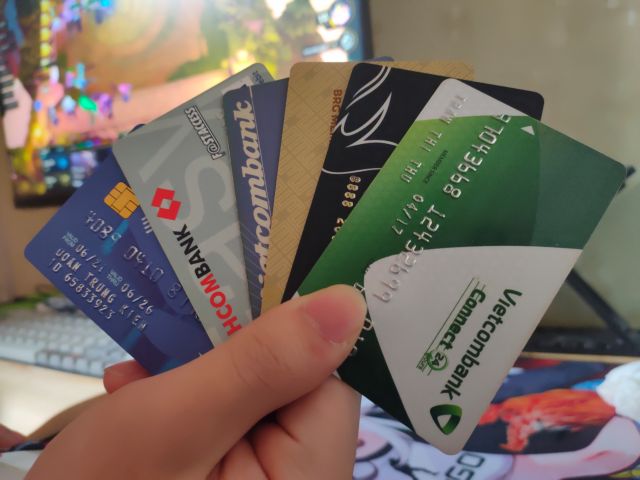There is still ample room for domestic credit card (DCC) growth since the number of DCC holders is relatively low in Viet Nam

There is still ample room for domestic credit card (DCC) growth since the number of DCC holders is relatively low in Viet Nam, according to experts at a seminar on DCCs held on Friday.
Nguyen Ngoc Hien, editor-in-chief of Lao Dong newspaper, underlined DCCs as an instrument for promoting cashless payments in the country.
DCCs allow holders to borrow loans to cover personal expenses and pay the loans off later with up to 55 days interest-free.
That means people can use DCCs to take out short-term loans with low-interest rates rather than turn to loan sharks for money, effectively curbing usury.
“Viet Nam is such a potential market for DCCs with its population of nearly 100 million,” claimed the editor-in-chief.
Le Van Tuyen, deputy director of Payment Department under the State Bank of Vietnam, revealed that by late 2021 there were 12 DCC-issuers in Viet Nam with a total of 475,000 active cards.
DCCs have become popular among many urban citizens, but not so among people living in rural areas who have stable incomes and want convenient payments for their daily spending.
Accordingly, there is still plenty of room for growth in the rural segment.
The deputy director also mentioned several conveniences of DCCs that enabled them to gain popularity among first-time users.
These include a simple process, long interest-free duration, low transaction fees and compatibility with the issuers’ existing debit payment networks.
To Dinh Ton, deputy general director of Vietnam Bank for Agriculture and Rural Development (Agribank), revealed that the bank had inaugurated its own DCC named Loc Viet in early 2022.
Loc Viet is a state-of-the-art duo card that combines debit and credit features. It offers unsecured loans to its holders to a credit limit of VND30 million (US$1,311) with a grace period of 55 days.
Agribank has been offering free points of sale (POS) devices with no transaction fees to promote the use of Loc Viet in rural areas.
“So far, 430,000 cards have been issued, a total overdraft of VND2.5 trillion ($109.3 million) has been granted, and over 5,000 new POS devices have been set up, raising the total number of POS devices to 15,000 in rural areas,” he said.
Ton believes that a client base of nearly 27 million families would give the bank a considerable advantage, allowing it to promote cashless payments in the country further.
Tran Thi An Dung, Ha Noi branch manager of Asia Commercial Joint Stock Bank (ACB), said that the bank’s DCC had been in use for five years and enjoyed an annual growth rate of about 80 per cent between 2017 and 2021.
She put the fast growth rate of the DCC down to its various facilities.
Notably, cardholders can pay in instalments for the goods and services of over 200 ACB’s partners without incurring any interest and fees.
For other goods and services, payments are interest-free and with small fees.
As ACB and NAPAS are cooperating to step up the growth of DCCs in the next 3-5 years, the manager urged NAPAS to revise its intercharge fees to reach out to more clients.
Nguyen Quang Minh, deputy general director of National Payment Services (NAPAS), revealed that the organisation had introduced its DCCs (NAPAS Credit) in January 2021.
NAPAS Credits are accepted by more than 300,000 payment terminals and e-commerce platforms nationwide and can be used to withdraw cash at over 20,000 ATMs.
So far, banks that have issued NAPAS DCCs include Agribank, ACB, VietinBank HDBank and Sacombank.
According to Minh, there were just 6.5 million credit cards in Viet Nam as of late June 2021.
This figure pales in comparison with the country’s population of nearly 100 million, meaning a bright prospect of growth for DCCs.
He expects more banks to get in on the act in the near future, making DCCs a norm in domestic payments.
Pham Tien Dung, deputy governor of the State Bank of Vietnam, asserted that clients would never go back to cash once they got used to cashless payments.
However, convincing cash-preferred clients to try cashless payments for the first time is not an easy task.
Accordingly, the deputy governor recommended DCC issuers must effectively communicate with their clients to keep them well-informed about the conveniences and facilities of DCCs.
He suggested incorporating payment terminals into all industries in the economy to expand the card acceptance network.
He also called for the widespread use of cashless payments and DCCs in rural areas to help the disadvantaged get access to financial services.
Lastly, the deputy governor requested DCC issuers and NAPAS to ensure the security and safety of the card system and safeguard the rights and interests of cardholders. — VNS





